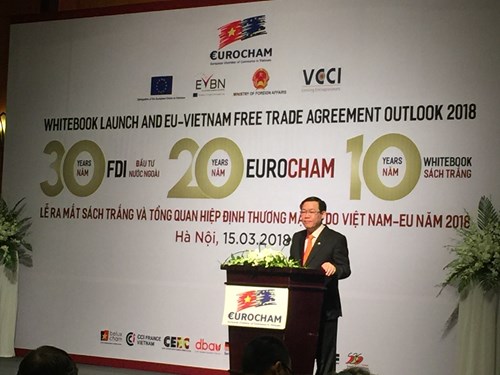The European Chamber of Commerce in Vietnam (EuroCham) announced the publication of the 2018 White Book on Trade and Investment Issues and Recommendations yesterday, in cooperation with the Vietnam Chamber of Commerce and Industry (VCCI).

The European Chamber of Commerce in Vietnam (EuroCham) announced the publication of the 2018 White Book on Trade and Investment Issues and Recommendations on Thursday, in cooperation with the Vietnam Chamber of Commerce and Industry (VCCI).
According to the 2018 White Book, Vietnam is an attractive destination for foreign direct investment, thanks to a number of legislative changes such as reducing tariffs, easing licensing conditions for foreign workers, tax incentives for business expansion or removal of corporate taxes.
The book also makes recommendations in terms of healthcare, agriculture, food and nutrition, consumer choice, sustainability and efficiency, as well as legal, tax and customs, from the addition of statutory representation to single member limited liability companies or the construction of a sustainable energy roadmap to attract new investments, to the enforcement of intellectual property rights.
In its 10th edition, the book marks not only 30 years of European foreign direct investment into Viet Nam, but also 20 years since the establishment of EuroCham.
The book brings up perspectives from EuroCham member companies, demonstrating European businesses’ aspirations of supporting the Vietnamese Government in developing sustainable business models that contribute to building a thriving business environment, for the benefit of businesses, investors and the public.
It focuses on market improvements, clean energy development, rights and laws for foreign workers clarification, facilitates the registration and enforcement of intellectual property rights and addresses specific sectoral issues such as reducing the tax burden on alcohol and providing advice on safety measures in the automotive sector.
Speaking at yesterday’s launch event, Deputy Prime Minister Vuong Dinh Hue said that Viet Nam appreciated EuroCham’s growth, which has helped boost Vietnamese GDP growth, investment and employment, as well as bringing economic and financial institutions closer to international standards.
The Deputy PM agreed that though there may be some technical issues in the White Book that still need to be amended, the Government of Viet Nam would continue to recommend short and long-term solutions to meet European and Vietnamese businesses’ requirements across all sectors.
Hue also asked EuroCham to actively participate in the process of ratification of the Vietnam-European Free Trade Agreement (EVFTA) to implement it as soon as possible.
With two-way trade increasing more than 12 times, from US$4 billion in 2000 to over $50 billion in 2017 and thousands of EU investment projects already in place in Viet Nam, a comprehensive FTA was yet another step to bringing the bilateral relationship to a new height, creating and maintaining a free trade and investment environment, Hue said.
He stressed that the EVFTA’s ratification and implementation would be an important message from the EU and Viet Nam to the world, showing determination on both sides to create and maintain free trade and investment in the face of emerging protectionism.
Gellert Horvath, EuroCham’s chairman, expressed his belief that the EVFTA is not only a reference agreement in the process of global trade integration through the reduction of tariffs and strong commitments, but also proof that Europe is a trusted partner for Viet Nam, helping to promote sustainable development for comprehensive and socially responsible enterprises.
Horvath said European partners were committed to strongly supporting Viet Nam in the process of modernisation and integration into the world economy, motivating its industries to develop and enhance the quality of its exports.
Ambassador Bruno Angelet, head of the Delegation of the European Union to Vietnam, said that Viet Nam had become a strategic partner of Europe, whereas the latter could help the former achieve its goals of sustainable economic growth. — VNS





